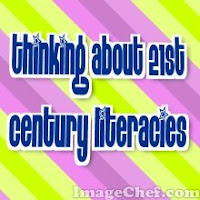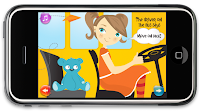Matt really helped me out by posting this video at Creating Lifelong Learners. In my quest to find great apps for the iPod Touches that we are getting, I am not finding a huge number of schools that are using them yet. This clip is packed with apps that would be useful in a classroom setting. But, I am very worried that most of the apps being marketed to schools are pretty traditional applications. They do things like allow you to record lectures, give information about presidents, help you check your knowledge with premade flashcards. When looking at ISTE NETS and P21 and NCTE Frameworks, I worry that very few of the apps I am seeing for schools really have the ability to transform education. Doesn't seem to be the creativity piece in many of the apps-made-for-school that I am finding. Instead they are just a more high-tech way to do pretty traditional things. Creation, communication, global citizenship, critical and media literacy aren't present in many of the apps.
I did find an elementary school that is doing lots with podcasting. Nova Blanche Forman Elementary School in Florida has about 180 iPods (9 carts). Their website shows that they are using them in ways that go beyond traditional teaching. Kids are actually creating podcasts connected to field trips, sharing work with parents at home, running student-led conferences, and more. Several of the projects are posted on the school's website.
I think for these technologies to make a difference, we have to think hard about students creating and communicating in new ways. Students owning the creations. Expanding our definitions of literacy to include podcasts, public service announcements, etc. The questions I am asking myself are:
How can these tools support reading and writing?
What are the new mentor "texts"-pieces for kids to study to inform their own craft as writers?
How can we use these tools in ways to help students build relationships and to work collaboratively?
Can they use these tools to solve real problems and answer their own questions?
How can they synthesize the huge amount of information?
How can they use these tools to create new information or new forms of information?
This week, I am trying to think specifically about booktalks. How can these new iPhones support deeper conversations around books? I think for this to happen, I need to find apps that students can use to track ideas throughout a book--to answer questions they have. They may find evidence of a characters' changing as they read a book. They may highlight some text that helps them think through the theme of the book. The kids in elementary school get pretty savvy about reading with depth and supporting their thinking with evidence from the text. I am wondering if they can use iPod stickynotes and notebook apps to better record their thinking so that they can share it with others. I have played with Notebook and Stickies and both have the potential for students to record, sharing and synthesizing information and then create new information based on the collaboration. I envision kids creating separate notebooks for books they are thinking about and then creating separate notes to track that thinking. One note could record lines in the text that tell something about a character. Another note could track changes in thinking--how does my thinking change about theme or big idea and why? Instead of any form we would create for them, kids could use the tool to collect the thinking they have to make the booktalk authentic.
I am also thinking about the podcast aspect in terms of booktalk. Could recording thinking for others to listen to before the group gets together in person, elevate the level of talk--knowing where people are coming from?
Could entire booktalks be done via iPods in a way that expands the amount of time kids could have to ponder the meaning of a book? Would this type of communication allow more talk and learning for kids who aren't in the same classroom and don't have day-to-day contact?
Would love to hear from anyone who has used/seen used iPods to support quality book talks.










